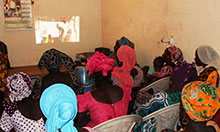
The Impacts of Diarrhea
In the past, everyone would wash their hands in a basin together. We didn’t know that this could spread germs. We have installed a tippy tap here and now everyone washes their hands one-by-one.
-Mariama Niang, community hygiene champion
Mariama Niang lives with her six children in the village of Touba Mourid in Senegal. Children in her community frequently suffer from diarrhea, due in part to a lack of information about the importance of handwashing to prevent the spread of the pathogens that cause diarrhea. According to Mariama, “Children were always going to the health hut (a local health clinic) because they fell sick so easily. There were too many cases of diarrhea to count.”
Diarrhea is a serious public health problem, killing more children than HIV/AIDS, malaria, and measles combined. And when diarrhea linked to poor hygiene practices doesn’t kill, it leads to infections that result in gut inflammation which, in turn, prevents nutrient absorption. Repeated episodes of such inflammation contribute to stunting, an indicator of malnutrition that has lifelong physical and cogitative consequences.
Becoming a Hygiene Champion
To reduce poor hygiene in her community, Mariama attended a training organized by USAID’s multi-sectoral nutrition project—Strengthening Partnerships, Results, and Innovations in Nutrition Globally (SPRING)—that taught her to be a local champion for improved hygiene.
SPRING trained Mariama and more than 250 other community members from 3 of Senegal’s 14 regions to establish and lead hygiene monitoring units. These units consist of 6-10 highly engaged and influential community members—often community health workers, village chiefs, local government representatives, and school teachers— who serve as champions for improved hygiene practices within their communities.
SPRING conducted workshops that build the capacity of unit members to help communities identify the critical moments for handwashing, adopt proper handwashing techniques, and master the skills needed to construct tippy-taps, simple handwashing stations that can be built and maintained with local materials.
Benefits in the Home and Community

Following her training, Mariama installed a tippy-tap at the entrance of her own compound. This small act had a big effect on her family's well-being. “We are a big household and we have lots of guests. In the past, everyone would wash their hands in a basin together,” she said. “We didn’t know that this could spread germs. We have installed a tippy tap here and now everyone washes their hands one-by-one.”
Through her training, she learned about this and other small doable actions to improve hygiene. “Before, the children didn’t like to wash their hands after playing,” she said. “They would just wipe their hands on their clothes and this was very frustrating for me as their mother because this made their clothes very dirty. Today, now that there is a tippy tap here, the children enjoy washing their hands. They see it as a fun game and now I no longer need to force them to wash their hands. Their clothes are cleaner too!”
As a hygiene champion, Mariama regularly tours her small village, inspecting households and reminding her neighbors of various hygiene best practices such as the critical moments of handwashing, the importance of cleaning and covering latrines, and the need to eliminate standing water around the family compound. She also helps her neighbors install tippy taps, inspects them to ensure they are functional, and ensures families know how to correctly use and maintain them. She reports that since the community embraced an increased focus on hygiene, the health hut sees few, if any, cases of diarrhea.
In 2017, SPRING promoted essential hygiene actions in more than 6,700 rural households and reached 876 children under two with village talks on nutrition and hygiene through the monitoring units. In addition, SPRING screened and discussed community-led videos to help villagers understand the basics of home hygiene in more than 100 villages. SPRING has also reached more than 900,000 people through community radio with messages on the importance of handwashing, critical moments for handwashing, and the role and importance of hygiene monitoring units.
